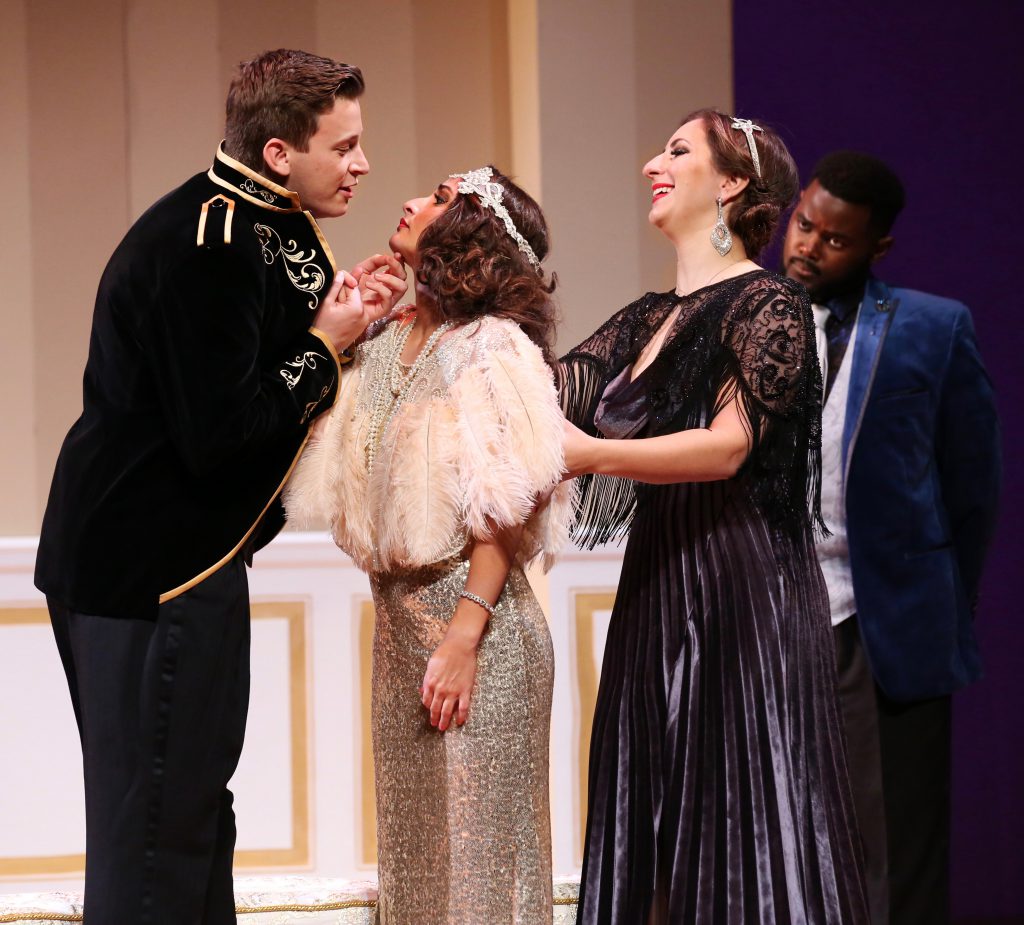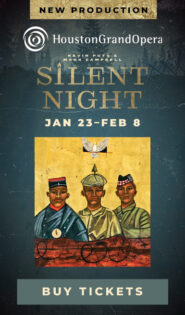Ars Lyrica Houston makes a successful leap into opera with Handel’s “Agrippina”

Aryeh Nussbaum Cohen (Ottone), Camille Ortiz (Popea), Sofia Selowsky (title role) and John Holiday (Nerone) in Ars Lyrica Houston’s production of Handel’s “Agrippina.” Photo: Amitava Sarker
After 20 years of showcasing baroque works familiar and neglected, Ars Lyrica Houston finally took the plunge on its first opera Friday night at Zilkha Hall. The vehicle was Agrippina, George Frideric Handel’s comic-dramatic tale of a Roman noblewoman who positively revels in lies, collusion and scheming.
Semi-staged performances of J.S. Bach’s “Coffee” Cantata and Handel’s Acis and Galatea in recent seasons had helped the group prepare for this major production.
Ars Lyrica’s abridged Agrippina still traced the twists and turns of the rivalry between the title character and her ally-turned-foe, Poppea–a saga so tangled that the emperor Claudio, trying to clear everything up at the opera’s climax, declares that he can’t figure out who’s telling the truth. Suffice it to say that after all the conniving, both Agrippina and Poppea get what they want: Agrippina’s son, Nerone, will attain the Roman crown, and Poppea will marry her sweetheart, the military officer Ottone.
On Friday, the maneuverings unfolded in a fast-paced, vividly sung performance.
Mezzo-soprano Sofia Selowsky brought Agrippina even more of the vivacity and juicy voice she lent another conspiratorial character–Rosina in Rossini’s The Barber of Seville—last season for Houston Grand Opera.
Selowsky’s wealth of vocal colors brought Agrippina’s stratagems to life—whether the power-hungry woman was working her wiles on her admirers, relishing her successes or reacting to surprise twists of fate. Even her recitatives crackled.
But Selowsky’s vigor and agility made the arias more potent still. The peak came in “Pensieri, voi mi tormentate,” the mood-swing aria that breaks out when Agrippina’s plot runs into trouble. Selowsky ranged from half-tones that exuded fear to full-throated outcries, and she spun out pianissimo phrases that made time stand still.
Soprano Camille Ortiz didn’t bring as much vocal heft to Poppea, the woman that Claudio, Nerone and Ottone all desire. But she sang with an energy, gleam and pointedness that enabled Poppea’s magnetism to shine through in the music. And Ortiz brought softer, gentler turns to her love song to Ottone: “Bel piacere,” Agrippina’s best-known number.
Ottone, the opera’s only honest and sincere character, was also the one that came across most compellingly Friday, thanks to countertenor Aryeh Nussbaum Cohen. For all the flair he brought the role of Sirenus in Handel’s Julius Caesar in last season’s HGO production, Cohen wielded a new emotional heft as Ottone.
Cohen’s voice boasted a warmth that few countertenors share; combined with the fluency and poise of his singing, his voice let Ottone’s arias exude forthrightness and nobility. The emotional climax came halfway through the story–when Ottone, though no fault of his own, suffers rejection by everyone around him. Cohen made Ottone’s response, “Voi che udite il mio lamento,” a musical portrait of desolation, from pianissimo phrases that were pale as death to surges of vibrant, plaintive sound.
John Holiday brought an entirely different countertenor voice to the role of Nerone. His tones were as laser-focused as Cohen’s were warm. The combination of brilliant sound and virtuoso agility turned Nerone’s scornful aria, “Come nube che fugge dal vento,” into a burst of vocal fireworks. But Holiday only eased up on the blazing tone rarely. Even when Ottone was supposed to be acting romantically, Holiday’s singing gave his music an aggressive edge.
Bass Timothy Jones brought Claudio’s arias a resonance and swagger that befitted an emperor. Baritone Brian Shircliffe and mezzo-soprano Cecilia Duarte sang with spirit as Pallante and Narciso, courtiers who get duped by Agrippina.
Perhaps to make the long and unfamiliar opera more palatable, artistic director Matthew Dirst pruned several numbers from Handel’s score. While the full-length Agrippina contains around 3½ hours of music, Friday’s performance clocked in at 2 hours and 40 minutes, including intermission.
Even if that was hardly the last word in completeness, it still spotlighted the richness of Handel’s music, an aria-filled roller-coaster ride through pride, passion, vengefulness, despair and other unbridled human urges.
Dirst, conducting Ars Lyrica 19-member period-instrument group from the harpsichord, put the music’s energy and buoyancy in the forefront, and the ensemble by and large played with energy and panache. But when Handel needed lyricism–especially in Ottone’s crucial aria–Dirst and company’s delicate colors and unhurried pacing complemented the singers.
Theatrically, Ars Lyrica’s Agrippina was modest. Rather than employing a set as such–the program credited no designer–the production relied on simple furniture pieces, such as chandeliers, settees and two segments of wall that moved onstage and off. Frank Vela’s lighting, such as the fierce red on the backdrop when Agrippina was angry, helped set the scenes’ emotional tones.
Stage director Tara Faircloth emphasized comedy, as in Claudio’s preening demeanor on his first entrance; Pallante and Narciso’s fawning over Agrippina; and the fluttering of the servant Lesbo, played by Eduardo Tercero. But for Handel’s serious moments–as in Ottone’s big aria,–Faircloth quieted everything down, and the poignant results helped Handel’s extraordinary music tell its story.
Ars Lyrica Houston repeats Agrippina 2:30 p.m. Sunday in Zilkha Hall in the Hobby Center for the Performing Arts. arslyricahouston.org; 713-315-2525.


Posted Aug 29, 2019 at 5:22 am by Elizabeth Morley
Wonderful! I watched Part 1 on youtube. Please give me a link to Part 2. Thank you.